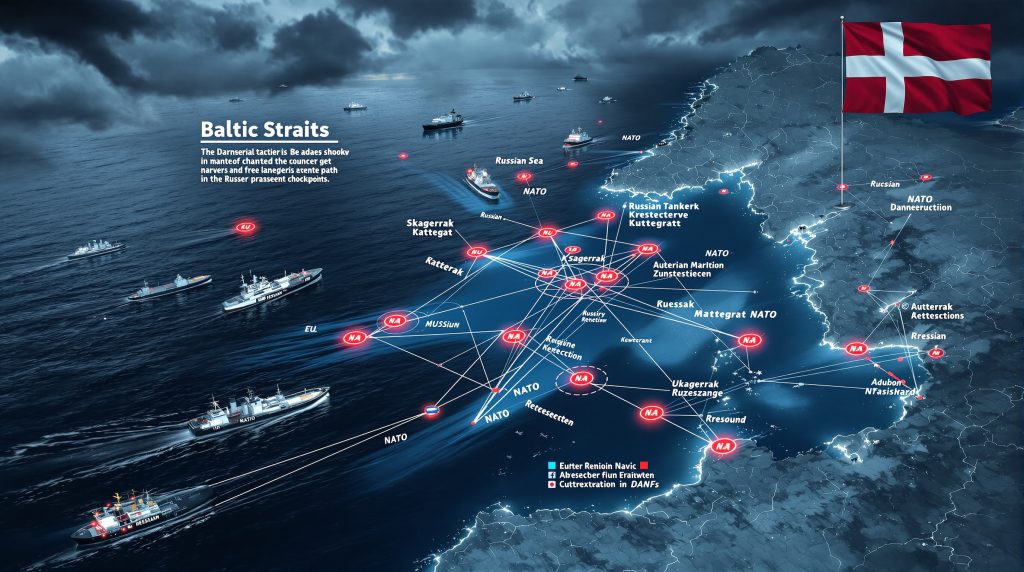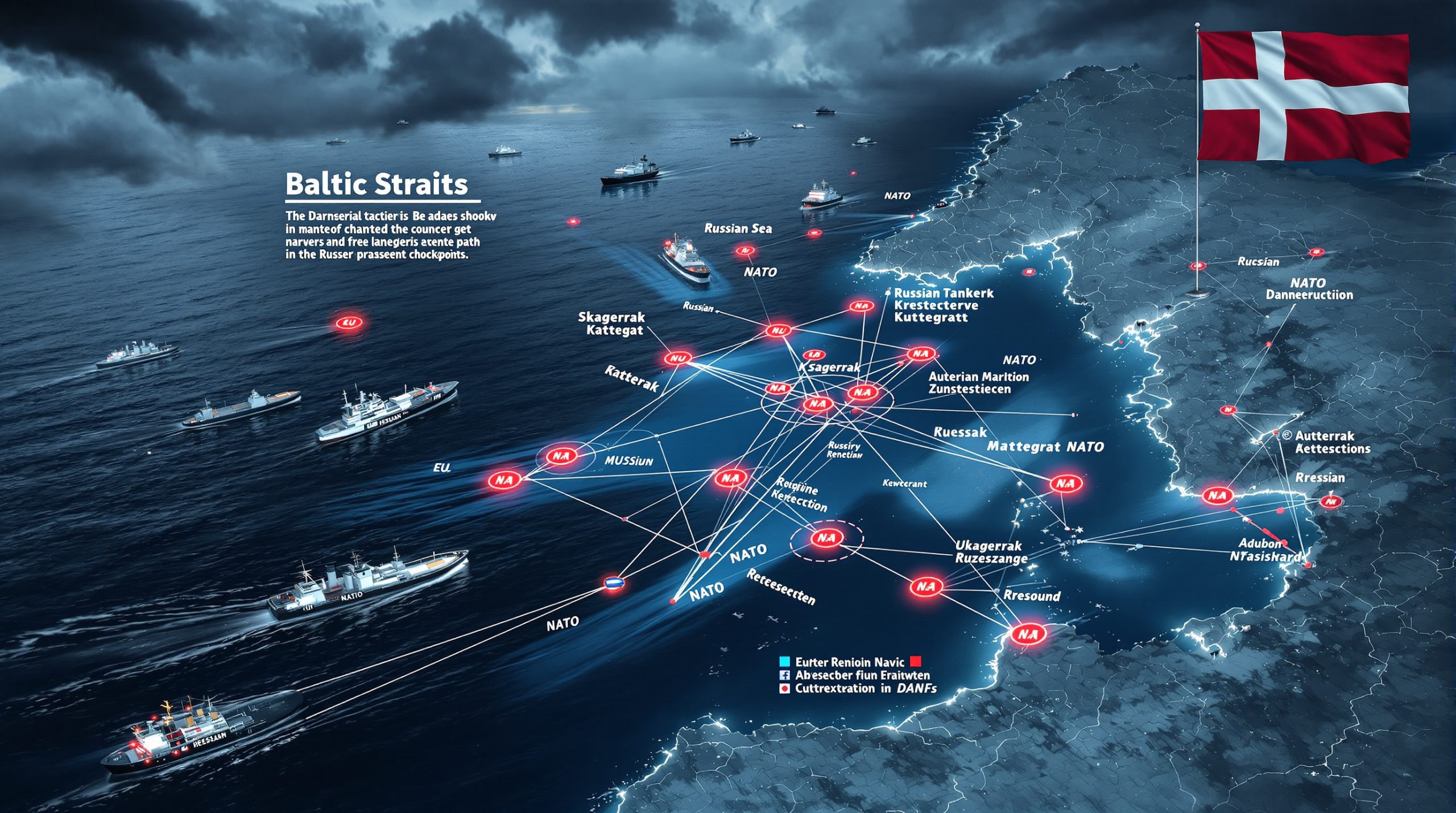Baltic Blockade: How EU and NATO Could Restrict Russia's Maritime Access
The escalating hybrid warfare tactics employed by Russia in northern Europe have pushed EU and NATO members to consider unprecedented maritime restrictions. Denmark's upcoming European Union Summit in Copenhagen will primarily focus on addressing these Russian aggressions, with Danish authorities already implementing preventive measures such as banning civilian drone flights in their airspace. This proactive stance comes amid increasing drone threats linked to Russian naval presence in the Baltic region.
Current sanctions against Russia, while impactful, have not fully restricted Moscow's maritime movements, particularly through Baltic outlets. This gap has prompted growing calls for more decisive action that could significantly impact Putin's strategic and energy security trends capabilities.
How Would a Baltic Access Denial Strategy Work?
The potential denial strategy would target critical maritime passageways including the Skagerrak, Kattegat, Danish Straits, and Øresund—narrow but vital waterways connecting Northern and Central Europe to global markets. These strategic chokepoints represent vulnerable areas where coordinated action could effectively restrict Russian movements.
Since Russia's invasion of Ukraine, the Baltic Sea has become a contested zone featuring suspicious activities such as:
- Operations of aging "shadow" tankers
- Suspicious anchor-dragging incidents severing subsea cables
- Repeated drone surveillance operations
- Airspace violations and probes
Western policymakers are now examining several legal options that could be implemented without direct military confrontation:
- Port denial policies targeting Russian-affiliated vessels
- Enhanced targeted sanctions on maritime operations
- Insurance and financial interdiction measures
- Increased naval patrols under clear legal mandates
- Persistent interdiction of ship-to-ship transfers
- Denial of bunkering and port services
While some discussions have included more aggressive measures such as vessel seizures, these remain controversial among NATO members due to legal constraints under UNCLOS (United Nations Convention on the Law of the Sea) and escalation risks.
What Legal Framework Supports Maritime Restrictions?
The Copenhagen Summit could potentially adopt a layered civil-military strategy leveraging peacetime authorities including:
- Customs enforcement mechanisms
- Port-state control regulations
- Sanctions enforcement protocols
- Insurance leverage tactics
- Enhanced naval presence
- Comprehensive monitoring systems
This approach would aim to maximize pressure while remaining within international legal frameworks, avoiding direct military confrontation that could trigger wider conflict. The implementation would likely consider recent Russian sanctions update discussions to ensure alignment with broader strategic goals.
Table: Potential Baltic Restriction Measures and Their Legal Basis
| Measure | Legal Basis | Implementation Challenges |
|---|---|---|
| Port denial | National sovereignty over ports | Coordination among multiple states |
| Insurance restrictions | Sanctions enforcement | Requires private sector compliance |
| STS transfer interdiction | Maritime safety regulations | Resource-intensive monitoring |
| Bunkering service denial | National control of service providers | Alternative supply sources |
| Enhanced monitoring | Freedom of navigation with restrictions | Technology and coverage gaps |
| Financial sanctions | International banking regulations | Circumvention through third parties |
How Would Baltic Restrictions Impact Global Oil Markets?
Restricting Russian access to the Baltic would create significant ripple effects throughout global oil market dynamics. The region hosts key Russian export nodes for both crude oil and petroleum products while serving as a critical hub for ship-to-ship logistics and dark fleet operations.
Immediate Market Impacts
Coordinated denial strategies, especially with insurer participation, would substantially increase Russia's operational costs through several mechanisms:
- Higher transport costs as vessels require longer alternative routes
- Increased insurance premiums for any vessels operating in restricted zones
- Logistical complications forcing costly adjustments to shipping patterns
- Heavier discounts on Russian oil barrels to attract buyers despite complications
While Russia maintains alternative export routes through the Arctic and Black Sea, these present significant disadvantages—Arctic routes become hazardous during winter months, while Black Sea operations remain vulnerable to Ukrainian attacks.
Regional Price Effects
The implementation of Baltic restrictions would likely trigger:
- Higher freight rates throughout northern European shipping lanes
- Insurance premium spikes for Baltic operations
- Regional price increases for refined products, particularly diesel and heating oil
- Supply chain reconfiguration costs passed to consumers
Long-Term Market Adaptations
If restrictions persist, markets would gradually adapt through:
- Rerouting of Russian exports primarily toward Asian markets
- Development of alternative logistics chains
- Restructuring of global petroleum product flows
- Pressure on Russian fiscal receipts as throughput and netbacks decline
Which Russian Ports Would Face the Greatest Impact?
Baltic denial measures would primarily affect Russia's western ports, particularly:
- Primorsk: Major crude oil export terminal
- Ust-Luga: Handles both crude and refined product exports
- St. Petersburg: Significant commercial port with petroleum handling capabilities
These facilities currently serve both European markets and facilitate transshipment to destinations beyond Europe. Sustained restrictions would force Russia to rely more heavily on:
- Arctic terminals (with seasonal limitations)
- Far Eastern ports (requiring longer transport distances)
- Black Sea facilities (vulnerable to Ukrainian action)
Why Is a Coordinated Response Essential?
The effectiveness of any Baltic restriction strategy depends entirely on coordination between multiple stakeholders:
- EU member states must align port access policies
- NATO members need to coordinate naval and monitoring activities
- Insurance providers must implement consistent compliance protocols
- Financial institutions require clear guidance on transaction restrictions
Without this coordination, Russia could exploit gaps between different national policies, undermining the overall strategy. The Copenhagen Summit represents a critical opportunity to establish this coordinated framework, especially considering the global trade impact of such restrictions.
What Are the Risks of Escalation?
While Baltic access restrictions offer potential leverage against Russia, they also carry escalation risks that must be carefully managed:
- Military response: Russia might interpret certain measures as acts of war
- Infrastructure targeting: Increased sabotage attempts against European energy infrastructure
- Cyber retaliation: Expanded cyber operations against Western targets
- Proxy conflicts: Intensified support for destabilizing activities in other regions
- Nuclear signaling: Potential nuclear rhetoric to deter Western actions
Decision-makers must balance effectiveness against these escalation risks, implementing measures gradually with clear communication channels maintained. As experts note, Russia's actions increasingly risk direct confrontation with NATO.
How Would Restrictions Complement Ukraine's Strategy?
A Baltic denial strategy would complement Ukraine's ongoing efforts to pressure Russia's economic base. Combined with Ukraine's drone and missile strikes on Russian energy infrastructure, these measures could create a two-front challenge to Russia's energy export capabilities.
This coordinated pressure could significantly impact Russia's ability to fund its military operations and potentially influence strategic calculations in Moscow regarding the conflict's sustainability.
What Would Be the Timeline for Implementation?
Any Baltic restriction strategy would likely follow a phased implementation approach:
Phase 1: Enhanced Monitoring and Coordination
- Increased surveillance of Russian maritime activities
- Information sharing between EU and NATO members
- Preparation of legal frameworks for restrictions
Phase 2: Targeted Restrictions
- Implementation of port access limitations
- Insurance compliance requirements
- Financial transaction monitoring
Phase 3: Comprehensive Denial Strategy
- Full coordination of port denial policies
- Active interdiction of ship-to-ship transfers
- Comprehensive monitoring and enforcement
This gradual approach would allow for assessment of Russian responses and adjustment of tactics to minimize escalation risks while maximizing pressure.
A Strategic Inflection Point
The consideration of Baltic access restrictions represents a potential strategic inflection point in the Western response to Russian aggression. By targeting Russia's maritime capabilities in a critical region, EU and NATO members could significantly increase economic pressure while demonstrating resolve against hybrid warfare tactics.
Oil markets must now factor these potential strategic decisions into their risk calculations, alongside traditional supply-demand fundamentals. The outcome of the Copenhagen Summit could signal a new phase in the Western approach to Russian maritime activities, with significant implications for global energy security and geopolitical stability.
Disclaimer: The geopolitical situation described in this article is highly dynamic. Any implementation of maritime restrictions would have complex legal, economic, and diplomatic consequences that would require careful assessment by policymakers.
Energy Market Implications
Energy analysts suggest that Baltic restrictions would have asymmetric impacts across different petroleum product segments. While crude oil flows might find alternative routes relatively quickly, refined product markets—especially diesel—could experience more sustained disruptions and price volatility.
European refiners, particularly those in the Baltic and North Sea regions, would need to adjust supply chains and potentially source feedstocks from more distant suppliers at higher costs. This transition period could create temporary but significant regional price premiums for certain products. Comprehensive tariff impact analysis would be essential for businesses operating in affected regions.
Table: Potential Product Impact Assessment
| Product | Short-Term Impact | Medium-Term Adaptation |
|---|---|---|
| Crude Oil | Moderate price premium | Rerouting to Asia via longer routes |
| Diesel | Significant regional shortages | New supply patterns from Middle East |
| Fuel Oil | Limited disruption | Minimal adjustment needed |
| Naphtha | Moderate impact | Sourcing from alternative regions |
| Jet Fuel | Regional tightness | New logistics chains development |
The Copenhagen Summit's decisions on Baltic access will be closely watched by energy traders and risk managers as a potential catalyst for market volatility and structural change in European energy flows.
Want to Spot the Next Major ASX Mineral Discovery?
Discover how significant mineral findings can lead to extraordinary market returns by exploring Discovery Alert's dedicated discoveries page, where their proprietary Discovery IQ model delivers instant notifications of significant mineral discoveries on the ASX, giving traders a crucial market advantage. Start your 30-day free trial today at https://discoveryalert.com.au/discoveries/ and position yourself to capitalise on the next major discovery announcement.




